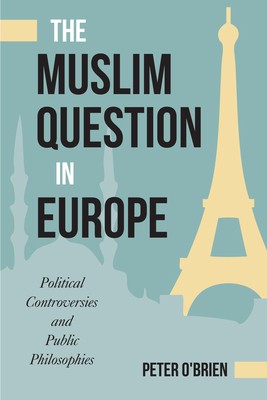
- We will send in 10–14 business days.
- Author: Peter O'Brien
- Publisher: Temple University Press
- ISBN-10: 1439912777
- ISBN-13: 9781439912775
- Format: 15.2 x 22.6 x 2.3 cm, minkšti viršeliai
- Language: English
- SAVE -10% with code: EXTRA
Reviews
Description
An estimated twenty million Muslims now reside in Europe, mostly as a result of large-scale postwar immigration. In The Muslim Question in Europe, Peter O'Brien challenges the popular notion that the hostilities concerning immigration--which continues to provoke debates about citizenship, headscarves, secularism, and terrorism--are a clash between "Islam and the West." Rather, he explains, the vehement controversies surrounding European Muslims are better understood as persistent, unresolved intra-European tensions.
O'Brien contends that the best way to understand the politics of state accommodation of European Muslims is through the lens of three competing political ideologies: liberalism, nationalism, and postmodernism. These three broadly understood philosophical traditions represent the most influential normative forces in the politics of immigration in Europe today. He concludes that Muslim Europeans do not represent a monolithic anti-Western bloc within Europe. Although they vehemently disagree among themselves, it is along the same basic liberal, nationalist, and postmodern contours as non-Muslim Europeans.
EXTRA 10 % discount with code: EXTRA
The promotion ends in 23d.10:59:16
The discount code is valid when purchasing from 10 €. Discounts do not stack.
- Author: Peter O'Brien
- Publisher: Temple University Press
- ISBN-10: 1439912777
- ISBN-13: 9781439912775
- Format: 15.2 x 22.6 x 2.3 cm, minkšti viršeliai
- Language: English English
An estimated twenty million Muslims now reside in Europe, mostly as a result of large-scale postwar immigration. In The Muslim Question in Europe, Peter O'Brien challenges the popular notion that the hostilities concerning immigration--which continues to provoke debates about citizenship, headscarves, secularism, and terrorism--are a clash between "Islam and the West." Rather, he explains, the vehement controversies surrounding European Muslims are better understood as persistent, unresolved intra-European tensions.
O'Brien contends that the best way to understand the politics of state accommodation of European Muslims is through the lens of three competing political ideologies: liberalism, nationalism, and postmodernism. These three broadly understood philosophical traditions represent the most influential normative forces in the politics of immigration in Europe today. He concludes that Muslim Europeans do not represent a monolithic anti-Western bloc within Europe. Although they vehemently disagree among themselves, it is along the same basic liberal, nationalist, and postmodern contours as non-Muslim Europeans.


Reviews